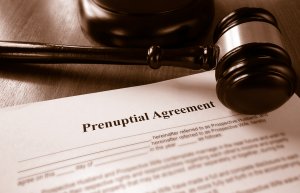Who Pays the Debts After Divorce?

Contact
Table of Contents
Am I liable for my husband’s debts if we are separated?
Debt is a significant source of stress for many people.
The average UK household now has debts of around £65,000 according to The Money Charity, and money troubles are one of the most common reasons why couples get divorced.
Once you have decided to go your separate ways, the question becomes one of how much liability you have for the debts that you and your spouse accumulated while together or apart.
The answer is more complicated than you might expect. The main factor will be whether the debt is considered to be joint debt, regardless of when it was incurred and whose name is on the account, or whether it can be shown that the debt was incurred outside the marriage.
Who is responsible for debts?
If you’re getting a divorce or legally separating with debt on the books, you’ll have to look at who is responsible for the debt in question.
Generally, the debt is tied to the person whose name is on the account. So if a credit card is in your name, you have to make the repayments, and the provider can pursue you if they’re not paid.
Where the debt in both names, you are both responsible for the whole debt. Although you might think you would each pay half, most joint loans and mortgages are structured with ‘joint and several’ liability. If one of you doesn’t pay, the other is liable for the full amount.
How are debts divided in a divorce?
Courts will look at how to divide up debts when calculating a fair financial settlement in your divorce.
They typically look at:
- Whether the debt was incurred during the marriage, and
- Whether it paid for something that would benefit both partners, or just one.
These factors are more important than whose name the debt is in. So while, as a general rule, each spouse is responsible for their own individual debts accrued during the marriage, a court might decide that the debt is a joint responsibility.
Matrimonial debt
The key matter is whether the debt is a matrimonial debt. Debts run up for the benefit of the family, for example, to buy furniture or pay for holidays, are likely to be considered a joint responsibility, even if the debt is only in one person’s name.
If you want to be released from responsibility for a debt, you will need to show that it is a non-matrimonial debt. If your spouse has racked up gambling debts that you knew nothing about, or maxed out their store card on designer clothes, then you could argue that you are not liable for the repayment of those debts and they are your spouse’s sole responsibility.
What about debts incurred before the marriage or after we separate?
Debts incurred by your spouse before the marriage may still be considered for the benefit of the family. A good example could be a student loan – even though the debt was incurred before marriage, the education and qualifications gained will have enhanced their earning potential during your relationship.
Debts that are racked up after you have separated, but before the Final Order is made, are more of a grey area. If it can be shown the debt is for the benefit of the family – even though you live apart, one of you might pay for a holiday or school fees, for example – then it is likely to be included in the matrimonial pot.
If your spouse took themselves off on a luxury holiday after you split up, don’t worry – that debt is likely to be considered non-matrimonial.
How will the debts be split?
A solicitor can give you an idea of what a judge might decide if the matter went to court. Each person’s financial situation is different, and the financial settlement will depend on a range of factors, such as how much each person earns and what other assets they have.
Also, it’s important to understand that the debt will not be physically “split.” The court does not have the power to transfer a loan or a debt from one name to the other’s. Instead, the court will consider how debts are factored into overall financial arrangements. For example, if there’s a matrimonial debt for the benefit of the family in your ex’s sole name, then your ex-spouse may receive a greater share of the equity in your family home or another asset to offset that debt.
How can we help?
Financial arrangements always involve some type of trade-off to achieve a fair outcome. A family law solicitor can help you to understand your options when it comes to how debts should be fairly considered as part of your financial settlement. To speak with us about your debt situation or divorce matters generally, contact us by:
- Filling in our online enquiry form; or
- Calling us on 020 7485 8811
Share this article
Contact us today
Call us 020 7485 8811
Email us Send us an email and we’ll get back to you
V prvom rade by sme chceli podakovat Panovi Bernatovi ze to za nas dotiahol do finalneho konca. Velmi profesionalna a diskretna advokatska poradna odporucam vsetkym.
Osbornes are an outstanding firm of solicitors with a deservedly strong reputation. They are very experienced in public law matters and I would not hesitate to recommend them. They are known for the important test cases they bring but are equally committed to the coalface work they do with vulnerable clients.’
William Ford is unbelievably clever and very considerate to his clients
"Jo Wescott represents the best of family law. Sensitive and caring with clients, tough yet effective in dealing with opponents, and showing fantastic judgment at all times."
"I would highly recommend Osborne Law to anyone going through a divorce. I worked with David Leadercramer and Kesha Pabari - both of whom I couldn't recommend enough. I worked particularly closely with Kesha who's really empathetic and human approach to working was hugely appreciated in really stressful times."
Accreditations
Related InsightsVIEW ALL
- 27.8.2024
Pension Sharing Orders
Pension Sharing in Divorce With so many things to consider when dividing up your finances during a divorce or dissolution...
Read more - 4.12.2023
My spouse is going bankrupt. Will it affect...
Divorce and Bankruptcy In 2022, more than 1 in 10 businesses reported a moderate-to-severe risk of insolvency. More than one in five (22%) of...
Read more - 23.3.2023
Does Divorce Jurisdiction Matter?
Jurisdiction in divorce I am a family law practitioner with a large client following in England and in Gibraltar. I...
Read more - 22.3.2023
Breadwinner or homemaker in divorce. Does it matter?
Breadwinner vs Housewife Divorce Rights When it comes to deciding how wealth is split in a divorce, English courts do...
Read more - 22.3.2023
What is Parental Responsibility?
Understanding Parental Responsibility Parental responsibility is the legal term used to describe parents’ duties and responsibilities for their children. These...
Read more - 16.3.2023
Are trusts protected from divorce?
Can trusts protect an inheritance from your spouse? A trust is a separate legal entity. Neither spouse owns its assets....
Read more - 16.3.2023
Is a limited company protected from divorce?
Is my spouse entitled to half of my business? If you are involved in running a limited company, then it...
Read more - 16.3.2023
How is a pension split in a divorce?
Pensions and Divorce In a divorce, pensions are taken into account together with all other financial assets. Once all assets...
Read more - 16.3.2023
Who gets the house in a divorce?
How is a house divided in a UK divorce? For most people thinking about getting a divorce, one of the...
Read more - 7.12.2022
IR v OR: Judge Dismisses Pre-Nup in Landmark £184...
One of the reasons I am still passionate about family law, after 20 years in the field, is that it is...
Read more - 30.8.2022
What is a transfer of equity?
Transfer of equity in divorce Transfer of equity refers to the process of transferring part or all of a property...
Read more - 30.8.2022
Do You Have To Go To Court For...
Can you divorce without going to court? If your divorce is uncontested and there are no disputes over issues such...
Read more - 22.8.2022
Capital Gains Tax on Divorce
CGT Changes Could Reduce Stress for Divorcing Couples The government has proposed a number of changes to the capital gains...
Read more - 6.5.2022
My Spouse Has Cut Me Off During Divorce
Can my spouse cut me off financially? Unfortunately, it is far too common that when clients say it’s over,...
Read more - 6.5.2022
How the Court views loans from parents during...
A frequent issue in financial divorce cases is a loan from a spouse’s parent, often to pay legal fees,...
Read more - 5.5.2022
Mesher Orders Explained
What is a Mesher order? A Mesher Order allows the sale of the family home to be postponed in the...
Read more - 11.4.2022
Financial Dispute Resolution (FDR) for Divorce
What is FDR for Divorce? Traditionally, a divorce financial settlement is dealt with by mutual agreement between the parties or...
Read more - 31.3.2022
10 Interesting Facts About Same Sex Marriage and Divorce
Eight years after same-sex marriage was written into law, we’re looking at these major life events by the numbers. 1....
Read more - 28.2.2022
Decree Nisi
Update: With the introduction of no-fault divorce in April 2022, a Decree Nisi became a Conditional Order, and a decree absolute...
Read more - 18.1.2022
6 cases that shape a private children dispute
Family disputes involving children can be particularly emotive, which is why our expert children lawyers work tirelessly to understand how...
Read more - 9.12.2021
Are irreconcilable differences grounds for divorce?
If you have come across this article, it may have resulted from an online search to see if you and...
Read more - 16.11.2021
Uncovering hidden assets in your divorce
Hiding Assets During a Divorce As part of your divorce, you and your ex will have to agree on dividing...
Read more - 10.11.2021
Difference between Decree Nisi and Decree Absolute
Update: With the introduction of no-fault divorce in April 2022, a Decree Nisi became a Conditional Order, and a decree absolute...
Read more - 9.11.2021
Keeping social media out of divorce proceedings
We’ve recently seen the playing out on Twitter and Instagram of the high-profile separation of actor Ioan Gruffudd and...
Read more





























